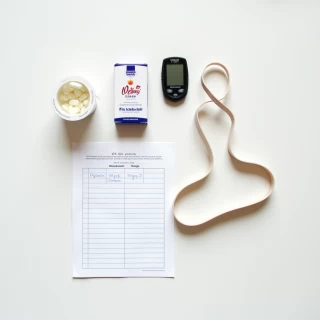- 5th April 2023
Keeping tabs on weight is an integral part of diabetes management, especially for slim patients on a specialized diet. Here's a thorough breakdown of the justifications:
1. Lean diabetic patients can gauge their progress towards their health goals by keeping a weight log. Patients can benefit from keeping tabs on their weight and body composition changes as a way to gauge the success of their diet and lifestyle changes. Patients can make the necessary dietary and lifestyle changes based on this data.
2. Lean diabetic patients have a lower caloric need than their overweight or obese counterparts, so it is important to adjust calorie intake accordingly. By keeping tabs on their weight, they can make sure they're getting the right number of calories to help them thrive. Patients who keep track of their weight on a regular basis are more likely to consume a healthy number of calories, leading to better management of blood sugar and health.
3. Muscle loss due to insulin resistance is a potential complication of diabetes. Monitoring body mass allows diabetics to keep an eye on whether or not they are gaining muscle mass, an important indicator of metabolic health. Patients can see their improvement in metabolic health brought on by their efforts to maintain or build muscle mass through regular weight checks.
4. Diabetic patients' blood glucose levels can be affected by their weight, so it's important for them to keep an eye on theirs. Monitoring these shifts through weight tracking allows for more precise control over blood sugar levels. Patients with diabetes must have this knowledge in order to avoid complications from the disease.
5. Preventing Complications: A healthy weight is crucial for avoiding diabetes-related complications like heart disease and kidney damage. Keeping tabs on a patient's weight can aid in preventing these complications by encouraging the maintenance of a healthy body weight.
![]()
6. Weight loss can stall or hit a plateau even when following a diet plan and making other changes to one's lifestyle. Keeping a weight log can help you recognise these stretches so you can make changes to your eating habits or exercise routine that will help you break through the plateau. Maintaining a healthy weight is easier if patients keep track of their progress on a regular basis.
7. Tracking your weight is a great way to keep yourself accountable to your diet and other healthy lifestyle changes. It encourages patients to keep working towards their goals by serving as a constant reminder to stay the course.
8. Gaining confidence and a sense of accomplishment are two effects of weight tracking that can help boost self-esteem. Better mental health goes hand in hand with better physical health, and weight tracking can help diabetic patients feel better about themselves.
9. Tracking weight can help lean diabetic patients avoid unhealthy habits like binge eating or eating too many high-calorie foods when they're trying to bulk up. Patients' weights are monitored to ensure they are gaining weight healthily, which has positive effects on their well-being.
10. Tracking patient weight allows doctors to tailor treatment to each person's unique needs. They can use the data to suggest individualised plans for healthier eating, more vigorous exercise, or modified dosing of medications.
In conclusion, monitoring weight is an important part of diabetes management for those on a reduced or balanced-calorie diet. The patient's progress can be tracked, their caloric intake can be adjusted, muscle atrophy can be avoided, blood sugar levels can be closely monitored, and complications can be avoided. Weight tracking also helps find roadblocks, encourages responsibility, boosts confidence, deters unhealthy habits, and allows for more individualised treatment. Patients with diabetes who keep close tabs on their weight are in a better position to control their condition and boost their health.














